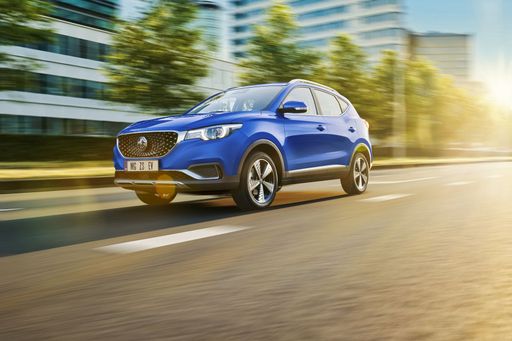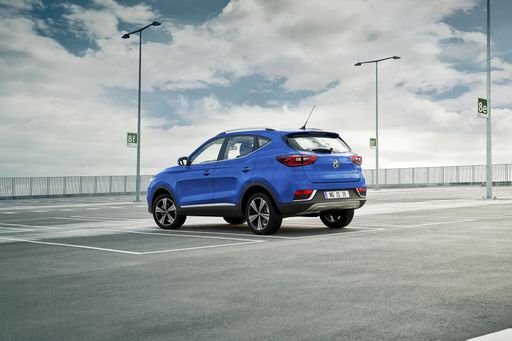MG ZS vs Toyota Prius – Which model is better for everyday use?
Everyday use, family trips or long-distance drives – here’s where the differences show.
Discover whether MG ZS or Toyota Prius fits your lifestyle better.
Costs and Efficiency:
When it comes to price and running costs, the biggest differences usually appear. This is often where you see which car fits your budget better in the long run.
MG ZS has a significantly advantage in terms of price – it starts at 18000 £, while the Toyota Prius costs 39400 £. That’s a price difference of around 21429 £.
Fuel consumption also shows a difference: Toyota Prius manages with 0.50 L and is therefore clearly more efficient than the MG ZS with 5 L. The difference is about 4.50 L per 100 km.
Engine and Performance:
Power, torque and acceleration say a lot about how a car feels on the road. This is where you see which model delivers more driving dynamics.
When it comes to engine power, the Toyota Prius has a a bit edge – offering 223 HP compared to 197 HP. That’s roughly 26 HP more horsepower.
In acceleration from 0 to 100 km/h, the Toyota Prius is distinct quicker – completing the sprint in 6.80 s, while the MG ZS takes 8.70 s. That’s about 1.90 s faster.
In terms of top speed, the MG ZS performs minimal better – reaching 179 km/h, while the Toyota Prius tops out at 177 km/h. The difference is around 2 km/h.
Space and Everyday Use:
Whether family car or daily driver – which one offers more room, flexibility and comfort?
Both vehicles offer seating for 5 people.
In curb weight, MG ZS is evident lighter – 1330 kg compared to 1620 kg. The difference is around 290 kg.
In terms of boot space, the MG ZS offers noticeable more room – 443 L compared to 284 L. That’s a difference of about 159 L.
When it comes to payload, MG ZS noticeable takes the win – 470 kg compared to 375 kg. That’s a difference of about 95 kg.
Who wins the race?
The Toyota Prius proves to be wins the duel decisively and therefore becomes our DriveDuel Champion!
Toyota Prius is the better all-rounder in this comparison.
 @ Toyota Motor Corporation
@ Toyota Motor Corporation
Toyota Prius
MG ZS
The MG ZS arrives as a cheeky and practical choice for shoppers who want SUV style and family-friendly space without blowing the budget. It may not pretend to be premium, but with sensible equipment, easy-to-live-with driving manners and surprising value, it makes a persuasive case for anyone after sensible transport with a bit of personality.
details @ MG Motor / SAIC Motor Corporation
@ MG Motor / SAIC Motor Corporation
 @ MG Motor / SAIC Motor Corporation
@ MG Motor / SAIC Motor Corporation
 @ MG Motor / SAIC Motor Corporation
@ MG Motor / SAIC Motor Corporation
 @ MG Motor / SAIC Motor Corporation
@ MG Motor / SAIC Motor Corporation
 @ MG Motor / SAIC Motor Corporation
@ MG Motor / SAIC Motor Corporation
Toyota Prius
The Toyota Prius stands as a pioneer in the realm of hybrid vehicles, offering an eco-friendly driving alternative with its innovative technology. Its aerodynamic design and comfortable interior make it a practical choice for those looking to reduce their carbon footprint without sacrificing style. Additionally, the Prius boasts a reputation for reliability and efficiency, contributing to its lasting popularity among environmentally conscious drivers.
details @ Toyota Motor Corporation
@ Toyota Motor Corporation
 @ Toyota Motor Corporation
@ Toyota Motor Corporation
 @ Toyota Motor Corporation
@ Toyota Motor Corporation
 @ Toyota Motor Corporation
@ Toyota Motor Corporation
 @ MG Motor / SAIC Motor Corporation
@ MG Motor / SAIC Motor Corporation
|
 @ Toyota Motor Corporation
@ Toyota Motor Corporation
|
|
|
|
Costs and Consumption |
|
|---|---|
|
Price
18000 - 24000 £
|
Price
39400 - 45800 £
|
|
Consumption L/100km
5 - 6.5 L
|
Consumption L/100km
0.5 - 0.7 L
|
|
Consumption kWh/100km
-
|
Consumption kWh/100km
-
|
|
Electric Range
-
|
Electric Range
72 - 86 km
|
|
Battery Capacity
-
|
Battery Capacity
-
|
|
co2
113 - 145 g/km
|
co2
12 - 17 g/km
|
|
Fuel tank capacity
41 - 55 L
|
Fuel tank capacity
40 L
|
Dimensions and Body |
|
|---|---|
|
Body Type
SUV
|
Body Type
Hatchback
|
|
Seats
5
|
Seats
5
|
|
Doors
5
|
Doors
5
|
|
Curb weight
1330 - 1420 kg
|
Curb weight
1620 - 1630 kg
|
|
Trunk capacity
443 L
|
Trunk capacity
284 L
|
|
Length
4430 mm
|
Length
4599 mm
|
|
Width
1818 mm
|
Width
1782 mm
|
|
Height
1635 mm
|
Height
1470 mm
|
|
Max trunk capacity
1457 L
|
Max trunk capacity
-
|
|
Payload
375 - 470 kg
|
Payload
365 - 375 kg
|
Engine and Performance |
|
|---|---|
|
Engine Type
Full Hybrid, Petrol
|
Engine Type
Plugin Hybrid
|
|
Transmission
Automatic, Manuel
|
Transmission
Automatic
|
|
Transmission Detail
Automatic Gearbox, Manual Gearbox
|
Transmission Detail
CVT
|
|
Drive Type
Front-Wheel Drive
|
Drive Type
Front-Wheel Drive
|
|
Power HP
116 - 197 HP
|
Power HP
223 HP
|
|
Acceleration 0-100km/h
8.7 - 12.5 s
|
Acceleration 0-100km/h
6.80 s
|
|
Max Speed
168 - 179 km/h
|
Max Speed
177 km/h
|
|
Torque
148 Nm
|
Torque
-
|
|
Number of Cylinders
4
|
Number of Cylinders
4
|
|
Power kW
85 - 145 kW
|
Power kW
164 kW
|
|
Engine capacity
1495 - 1498 cm3
|
Engine capacity
1998 cm3
|
General |
|
|---|---|
|
Model Year
2024 - 2025
|
Model Year
2023
|
|
CO2 Efficiency Class
C, E
|
CO2 Efficiency Class
B
|
|
Brand
MG
|
Brand
Toyota
|
What drive types are available for the MG ZS?
The MG ZS is available as Front-Wheel Drive.
The prices and data displayed are estimates based on German list prices and may vary by country. This information is not legally binding.
